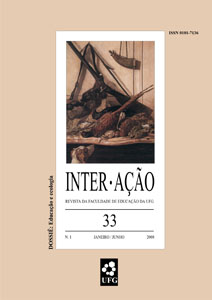Educação E Ecologismo no Enfrentamento do Egocentrismo moderno: o reaprendizado
DOI:
https://doi.org/10.5216/ia.v33i1.4236Abstract
Já há algum tempo, a educação aliou-se ao pensamento ecológico no intuito de compreender e reorientar a relação entre ser humano e ambiente, porém poucos avanços efetivos resultaram desses esforços. Buscamos aqui evidenciar possíveis causas do distanciamento entre discurso e prática, em dois movimentos históricos que delinearam o pensamento moderno: os desdobramentos da racionalidade tecno-científica e o movimento de antropologização que reforça o princípio da individuação, embasando-nos em reflexões da teoria crítica e da fenomenologia, representadas especialmente por Habermas e Merleau-Ponty. Tratamos ainda do distanciamento do mundo vivido, da perda de sentido da alteridade e dos significados da experiência estética e da educação ecológica na re-ligação do ser humano com a concretude.Downloads
Downloads
Published
How to Cite
Issue
Section
License
Inter-Ação uses the Creative Commons Attribution 4.0 License for Open Access Journals (Open Archives Initiative - OAI) as the basis for the transfer of rights. Open access means making documents available on the Internet free of charge, so that users can read, download, copy, distribute, print, search, or link to the full text of documents, process them for indexing, use them as input data for software programs, or use them for any other lawful purpose, without financial, legal, or technical barriers.
Authors publishing in this journal agree to the following conditions:
1) Authors retain copyright and grant the journal the right of first publication, with the work simultaneously licensed under the Creative Commons Attribution License, which permits redistribution of the work with attribution and first publication in this journal.
2) Authors are permitted to enter into additional, separate agreements for non-exclusive distribution of the version of the work published in this journal (e.g., for publication in an institutional repository or as a book chapter), with attribution and first publication in this journal.
3) Authors are permitted and encouraged to publish and distribute their work online (e.g. in institutional repositories or on their home page) at any time before or during the editorial process, as this may generate productive changes as well as increase the impact and citation of the published work.















